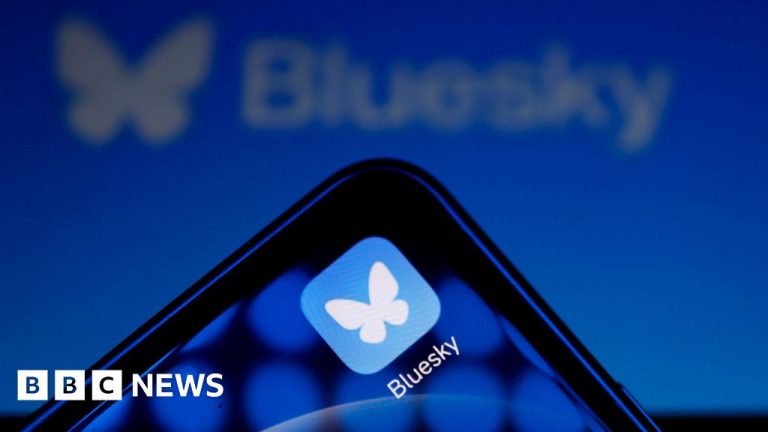Getty
You may have recently seen the word “Bluesky” pop up on your social media pages and wonder what people are talking about.
This is an alternative platform to Elon Musk's X and in terms of color and logo it looks quite similar.
Bluesky is growing rapidly and is currently seeing around one million new registrations per day.
It had 16.7 million users at the time of writing, but that number will likely be out of date by the time you read this.
So what is it – and why are so many people joining it?
What is Bluesky?
Bluesky describes itself as “social media the way it should be,” although it looks similar to other sites.
Visually, a bar on the left of the page displays everything you would expect: search, notifications, home page, etc.
People using the platform can post, comment, repost and like their favorite content.
To put it simply, this looks like what X, formerly known as Twitter, looked like.
Blue sky
The Bluesky page looks remarkably similar to other social media platforms
The main difference is that Bluesky is decentralized – a complicated term that basically means users can host their data on servers other than those owned by the company.
This means that rather than being limited to having a specific account named after Bluesky, people can (if they wish) sign up using an account they own.
But it's worth pointing out that the vast majority of people don't do this and a new member will most likely have a “.bsky.social” at the end of their username.
Who owns Bluesky?
If you think that sounds a lot like X, you won't be surprised why. Former Twitter boss Jack Dorsey created it.
He even once said that he wanted Bluesky to be a decentralized version of Twitter that no single person or entity owns.
But Mr Dorsey is no longer part of the team behind it, having left the board in May 2024.
He deleted his account completely in September.
It is now led and primarily owned by its CEO Jay Graber as an American public benefit corporation.
Why is it gaining popularity?
Bluesky has been around since 2019, but it was invite-only until February of this year.
This allowed the developers to iron out any issues behind the scenes, trying to stabilize it before opening the doors to the general public.
The plan worked, to a certain extent. But the influx of new users was so great in November that there are still problems with outages.
Blue sky
It is no coincidence that the number of new Bluesky users increased after Donald Trump's victory in the US elections in November.
X's owner, Mr. Musk, was a big supporter of Trump during his campaign and will be heavily involved in his administration.
Inevitably this led to political division, with some people leaving X in protest.
But others gave different reasons, such as the Guardian newspaper which chose to no longer publish messages there, calling X a “toxic media platform”.
Meanwhile, Bluesky's app continues to see strong downloads around the world and was the top free app in Apple's UK App Store on Thursday.
Several celebrities, from pop singer Lizzo to Taskmaster's Greg Davies, have announced they are joining the platform and limiting their use of X – or, in some cases, leaving it altogether.
Other names you might recognize include Ben Stiller, Jamie Lee Curtis and Patton Oswalt.
But this growth, while significant, will need to continue for a long time before Bluesky is able to truly compete with its microblogging rival.
X doesn't share total user numbers, but it's measured in the hundreds of millions, with Elon Musk previously saying the platform has 250 million users every day.
How does Bluesky make money?
This is literally the million dollar question.
Bluesky started with funding from investors and venture capital firms and has raised tens of millions of dollars through these means.
But with so many new users, he'll need to find a way to pay his bills.
Back in the days of Twitter, the site made the vast majority of its money through advertising.
Bluesky said he wants to avoid that. Instead, it said it would continue to look at paid services, such as charging users for custom domains in their username.
It sounds complicated, but it essentially amounts to making a person's username even more personalized.
For example, this could mean that my username – @twgerken.bsky.social – could in future sound more official, like @twgerken.bbc.co.uk.
Proponents of this idea argue that it is also a form of verification, as the organization that owns the website would have to authorize its use.
If Bluesky owners continue to avoid advertising, they will inevitably have to turn to other, broader options, such as subscription features, to keep the lights on.
But if it doesn't make a lot of money, it wouldn't be unusual for tech startups.
In fact, Twitter, before being bought by Mr. Musk in 2022, only turned a profit twice during its eight years as a stock exchange.
And we all know how that ended: a huge payday for investors when the world's richest man paid $44bn (£34.7bn) for the privilege of owning it.
For now, Bluesky's future remains unknown, but if its growth continues, anything is possible.

